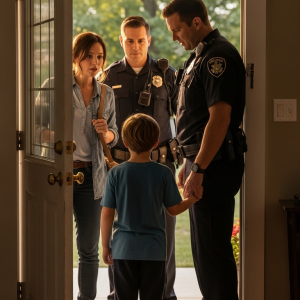According to my parents, I was terrorizing my disabled sister. My weapon of choice? Walking. My footsteps, they claimed, were an act of aggression, a sonic assault on Vanessa’s delicate senses. So, they made me wear giant foam slippers that made me look like a cartoon bear.
This all began when Vanessa came home from college, armed with a new ADHD diagnosis. Suddenly, my very existence was a trigger. To appease her, I shuffled through the house in those ridiculous slippers. But of course, that wasn’t enough. Soon, she was crying to Mom that the vibrations from my steps were scrambling her brain.
Vanessa presented my parents with a binder of articles on sensory processing issues. My mother, completely convinced, spent hundreds on special carpet runners. I was now confined to marked trails through my own home, taking tiny, tightrope-walker steps. My boyfriend dumped me, saying my bizarre behavior was too much to handle.
Still, it wasn’t enough for Vanessa. She created a laminated schedule dictating when I was allowed to move. Her “focus blocks” conveniently ran from 7 a.m. to 11 p.m. I had to text my own sister for permission to use the bathroom, a request she would often ignore for hours. She was documenting my every move, my every “unauthorized” step, as evidence of my aggression.
The breaking point came when Vanessa failed a college exam. She claimed my midnight trip to the kitchen for a glass of water sent vibrations through the floorboards, erasing all her knowledge. My parents lost their minds. My dad installed motion sensors on my bedroom door.
Then, my mom moved my bed to the garage. “It’s more private out here,” she said, her voice strained with false cheerfulness. “You can walk around all you want.” She bought me a space heater, as if that made sleeping next to cans of gasoline and breathing in exhaust fumes okay.
Even that wasn’t enough. Vanessa had a full-blown meltdown, rocking on the floor and sobbing about my “hostile energy” seeping through the walls, poisoning her ability to concentrate. My parents called a family meeting and announced I had to go. I would stay with relatives until Vanessa’s semester was over.
They told everyone I was abusing my disabled sister, that I was actively trying to sabotage her education. That night, they drove me to my aunt’s house with two garbage bags of my belongings. They didn’t even let me pack properly. They just wanted me gone. My aunt, clearly fed my parents’ story, had soundproofed the guest room and handed me a new pair of special slippers.
Three days later, I was using my aunt’s laptop when I noticed her email was open. I saw a receipt for Vanessa’s tuition payment, but the amount seemed wrong. A knot of suspicion tightened in my stomach. The next morning, my hands trembling, I called the college.
Pretending to be Vanessa, I asked for an enrollment verification for insurance. The registrar’s voice was flat and professional. “Ma’am, our records show you haven’t been enrolled since spring of 2023. You were academically dismissed.”
The world stopped. Eighteen months. She hadn’t been a student for eighteen months. I dug deeper, calling a friend whose brother attended the same college. He laughed when I asked. “Your sister? Everyone knows she got kicked out freshman year for plagiarism.”
I sat there, the phone pressed hard against my ear, a cold dread washing over me as the pieces clicked into place with horrifying clarity. The timeline, the bizarre symptoms, the desperation to get me out of the house… it was all a lie. My aunt walked in and saw my face. When I showed her everything, she immediately called my parents and put them on speaker.
“When is the last time you actually saw Vanessa’s grades?” my aunt asked, her voice sharp. There was silence, then my mom’s worried muttering as she tried and failed to log into the parent portal. My dad called the bursar’s office. The truth came out in a rush of strangled disbelief. They had paid over $60,000 in tuition for a ghost. Vanessa had pocketed every cent.
When confronted, Vanessa tried to blame me, screaming that I had deliberately overstimulated her to drive her insane. This time, no one was buying it. My parents began spam-calling me, begging me to come home, but I ignored every call. I was done.
The next day, I went to my own student portal to register for my spring classes. That’s when I saw it: Withdrawal requested by student. My heart hammered against my ribs. I called the registrar. “Yes,” the woman confirmed, “the withdrawal form was submitted yesterday at 11:47 p.m.”
Vanessa had withdrawn me from college. While I was sleeping at my aunt’s house, my own sister had logged into my account and tried to destroy my future. I called campus security, my voice cracking, but they were useless. It was a registrar issue, they said. Nothing they could do until morning.
Remembering my aunt’s advice to document everything, I took screenshots of the withdrawal confirmation, the timestamp, and the IP address at the bottom of the page. The numbers looked familiar. I compared them to an old email from my parents’ computer. It was a perfect match. The withdrawal had been submitted from their house.
Unable to sleep, I logged into my university email settings. A forwarding rule had been set up four months ago. Every email from my college was being automatically sent to an address I didn’t recognize. My stomach churned as I scrolled through my sent folder, finding emails I never wrote.
Replies to professors dropping their classes. Messages declining scholarship opportunities. An email turning down a paid research position. I found the original messages in my trash folder: warnings from the financial aid office, invitations to the honor society, concerned emails from professors about my absences. Each one had been intercepted by Vanessa before I ever saw it.
The next morning, my aunt drove me to campus. The registrar was sympathetic but firm. To reverse the withdrawal, I needed a police report for identity theft, my department head’s approval for readmission, and I had to complete all my missed coursework. “How long do I have?” I asked.
She checked her screen. “Seventy-two hours before your spot in the program is permanently released.” Three days to save four years of my life. We went straight to the police station. The officer was dismissive, calling it a “domestic dispute.” But when I went back that night after discovering Vanessa had also opened three credit cards in my name, racking up $15,000 in debt, his tone changed.
“Credit card fraud is a felony,” a detective told me. “We’ll be arresting your sister tomorrow.”
My department head agreed to readmit me, but with a condition: I had to complete four months of missed assignments in just two weeks. It was an impossible task, but it was my only chance. My best friend, Ashley, immediately drove down to help, bringing a folder of every text conversation we’d ever had about Vanessa’s abuse.
The evidence piled up. Notarized witness statements. Screenshots of Vanessa’s Instagram, showing her at loud parties on nights she claimed to have sensory-induced migraines. My aunt called a lawyer friend who took the case pro bono. The night before Vanessa’s arrest, my parents called, screaming that I was destroying the family. My dad offered to pay for everything if I just dropped the charges. My aunt recorded the entire bribery attempt and sent it to the detective.
Vanessa’s arrest was messy; she tried to run and was tackled on the front lawn. Her mugshot went viral in our hometown. At the trial, in a shocking move, she fired her public defender and chose to represent herself. It was a disaster. She cross-examined me by asking questions that made her look guiltier.
“Isn’t it true you were jealous of my academic success?” she demanded. “You were expelled for plagiarism,” I replied calmly. “I wasn’t asking about that!” she sputtered, as the jury looked on, confused.
She accidentally confessed to changing my passwords, forwarding my emails, and taking the tuition money, claiming she “deserved it.” The evidence against her was overwhelming. Dr. Reeds, a renowned ADHD specialist, testified that Vanessa’s claimed symptoms were medically impossible and that she actually showed clear signs of antisocial personality disorder. The jury deliberated for just two hours. Guilty on all counts.
Vanessa was sentenced to three years in state prison and ordered to pay back every cent she stole, plus damages. As they led her away, she turned to me, her face twisted with hate. “You destroyed this family,” she hissed. “I hope you’re happy.” I didn’t feel happy. I just felt empty.
My parents sat in the back row, their faces grim. They left without a word. The next day, I changed my phone number and blocked them on every platform imaginable. They sent a letter, forwarded by my aunt, saying they were selling the house to pay for Vanessa’s appeal and moving to Florida. The letter blamed me for choosing “revenge over family.” I threw it in the trash.
Thanks to Ashley and a few classmates who staged a homework marathon, I completed the four months of work in fourteen brutal days. My GPA held steady. My professor, impressed by my resilience, offered me a paid research position. Life slowly started to move forward.
The first restitution check was for a paltry sum, a reminder that true accountability would take decades. A letter from Vanessa arrived from prison; it was three pages of her forgiving me, with no apology or acknowledgment of her own actions. I burned it. On Christmas, my parents sent a card with a $1,000 check. I donated it to a domestic abuse shelter and sent them the receipt.
One day in my new role as a teaching assistant, a young student stayed after class. She told me her sister claimed her breathing was too loud, making her sick, and that her parents wanted her to move to the basement. I recognized the confused, self-doubting look in her eyes instantly.
“That’s not normal,” I told her gently. “Breathing doesn’t make people sick.” I gave her information on gaslighting and emotional abuse and directed her to the campus counseling center. She left looking a little less broken, a little more hopeful.
That afternoon, I walked back to my office with heavy, deliberate footsteps. My boots echoed in the empty hallway. A colleague looked up, startled. “Sorry,” he said. “Didn’t hear you coming. You’re usually so quiet.”
A small smile touched my lips. “Not anymore,” I said. I walked louder after that, letting my footsteps announce my presence. Each step was a declaration that I existed, that I had the right to take up space, to make noise, and to live my own life, finally free from the silence they had tried to impose on me.
The act of walking louder was the first step, a conscious rebellion that slowly, over a year, became second nature. My life in graduate school became a sanctuary of logic and reason, a world away from the calculated madness of my family. I excelled in my research on trauma and memory, finding a strange, clinical comfort in mapping the very neural pathways that my own experiences had so violently rewired. My professor, Dr. Anya Sharma, became a mentor, her sharp intellect a grounding force.
My friendship with Ashley remained my anchor. We had weekly video calls where we’d talk more about bad dates and frustrating lab results than about my past. With my therapist, I learned to untangle the knots of guilt Vanessa had tied around my psyche for years. I learned that the hypervigilance—the way my heart still leaped when I heard unexpected footsteps behind me, the constant need to check that doors were locked—was not a weakness, but a scar left by a war I had survived.
The restitution checks arrived every few months, laughably small amounts that felt less like justice and more like a periodic taunt from a ghost. I stopped opening the envelopes, simply depositing them and filing the statements away. The money couldn’t buy back the years I spent doubting my own sanity, nor could it erase the image of my mother’s face as she explained why I had to sleep next to gasoline cans.
One crisp autumn afternoon, two years after the trial, a certified letter arrived at my apartment. It wasn’t from my parents or the prison. It was from the state parole board. My breath caught in my chest. Vanessa was eligible for an early release hearing in three months, based on good behavior and participation in inmate programs. They were legally required to notify me, the primary victim of her crimes.
It felt like a punch to the gut. The carefully constructed peace of my new life shattered. That night, I couldn’t sleep. The garage felt closer than ever—the cold seeping through the concrete floor, the metallic tang of the air, the suffocating smallness of it all. I found myself walking on my toes again, a subconscious retreat into the silence that had been demanded of me.
The next morning, I called Ashley before she even left for work. “She’s getting out,” I said, my voice thin. “Maybe. She has a hearing.”
“Okay,” Ashley said, her voice instantly calm and steady. “So we prepare. What are your options? Can you submit a statement? Can you get a restraining order? We’re not back at square one. You have an army of evidence and a track record of her being a menace to society.”
Her pragmatism cut through my panic. She was right. This wasn’t the past. I was no longer the girl trapped in a house of lies, I was a woman with resources. My next call was to the prosecutor’s office, and then to the lawyer my aunt had found for me. We began preparing a victim impact statement for the parole board, detailing the ongoing psychological and financial damage.
More importantly, we filed for a permanent restraining order. My lawyer was confident. “Given the felony convictions for identity theft and fraud, plus the witness intimidation from jail, a judge is highly likely to grant it,” she explained. “It means she cannot contact you, come near your home or workplace, or even mention you online. It builds a legal wall.”
The process was grueling. It forced me to revisit every ugly detail: the slippers, the schedule, the withdrawal, the credit cards. But this time, it was different. I wasn’t recounting it with the frantic desperation of someone trying to be believed. I was stating documented facts for the official record. I was building my defense, not for a crime I didn’t commit, but for the future I was determined to protect. My therapist called it “reclaiming the narrative,” and for the first time, I truly understood what that meant.
A week before the parole hearing, I was leaving the university library late at night when I heard someone call my name. I turned, my body tensing, before I recognized the young woman hurrying toward me. It was the student from my biology lab, the one whose sister had been starting down Vanessa’s path.
“I just wanted to say thank you,” she said, her smile bright and genuine. “You probably don’t remember me, but what you said to me last year… it changed everything.” She explained how she had started documenting her sister’s behavior, gone to the campus counseling center, and eventually brought the evidence to her parents. They had finally woken up and gotten her sister into intensive therapy.
“I’m still living at home, but I don’t live in the basement,” she said, her eyes shining. “We have boundaries now. Real ones. You helped me find my voice. I just wanted you to know that.”
We stood there for a moment under the campus lights, two strangers connected by a strange and specific trauma. In her story, I saw a different outcome, a path not taken where a family chose to heal instead of fracture. When she walked away, I felt a profound sense of peace settle in my chest, a feeling that had nothing to do with Vanessa’s hearing or my parents’ absence. The echo of my pain had become a warning cry that had helped someone else. My story was no longer just a burden; it was a tool.
The restraining order was granted the day before the hearing. A week later, I received the board’s decision: parole denied. Vanessa would serve her full sentence. There was no elation, no sense of victory, only a quiet, deep relief. The wall was secure.
That night, I didn’t dream of the garage. I walked home from the lab, my heavy boots making a satisfying, rhythmic sound on the pavement. I took up space. I made noise. I entered my quiet, safe apartment, locked the door, and for the first time in what felt like a lifetime, I knew the only footsteps I would hear were my own.




